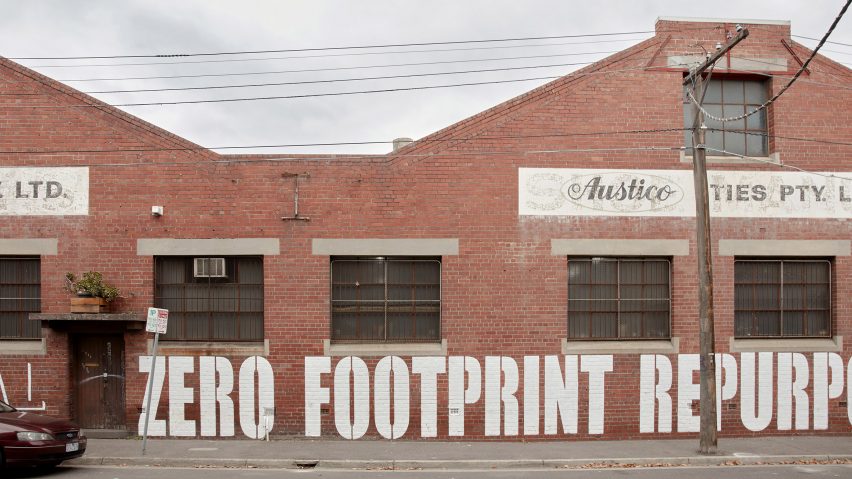Australian building company Revival Projects has turned a warehouse that is set for redevelopment into a hub for repurposing construction and demolition waste, which is open to the public during Melbourne Design Week.
Melbourne Design Week describes the Zero Footprint Repurposing hub as one of the world's first free hubs dedicated to the storage and reuse of demolished material.
Revival Projects aims to save these materials from landfill by making them more accessible to architects, designers, builders and manufacturers.
The Zero Footprint Repurposing hub stores materials from projects around Melbourne, with Revival Projects facilitating large-scale repurposing initiatives from various sites.
"For repurposing of existing materials to be a fundamental element of new design, storage of a large amount of demolished materials is necessary, often for many months or several years, while the project comes to life," Revival Projects founder Robbie Neville told Dezeen.
"The idea of this costly storage is often a prohibitive issue, so we have offered the industry free storage of materials in our Collingwood space, if they are going to repurpose those materials back into their project."
"We present this dramatic commercial offer with zero obligation to engage us for any of our services – which include structural engineering, commercial and domestic building, and joinery and furniture making – so we are effectively removing that prohibitive issue of space, with no strings attached," he continued.
The Zero Footprint Repurposing hub is located in Collingwood, in a 100-year-old, 1,500-square-metre warehouse that Revival Projects will occupy until its slated demolition in 2024.
Revival Projects is working with the architects of the future development, Grimshaw, to repurpose the existing materials from the warehouse into the new buildings.
The hub also currently stores material from architects and developers including FJMT, Edition Office, BAR Studio, Hip V. Hype, Kerstin Thompson Architects, ANPlus Developments and Bayley Ward Architects.
The interior of the space is decorated with murals, art, quotes, installations and materials that communicate the project's vision.
"Our mission here is to revolutionise the way our industry approaches existing materials," said Revival Projects founder Robbie Neville. "We are disrupting centuries of traditions based on reckless consumption of natural resources."
According to RMIT, 20.4 million tons of waste were generated from construction and demolition in Australia in 2017, including through works such as road and rail maintenance and land excavation, and about one-third of this ended up in landfill.
The waste from these activities include bricks, concrete, metal, timber, plasterboard, asphalt, rock and soil.
A registered builder, Neville founded Revival Projects in 2016, after four years of running his own salvage missions but becoming frustrated that the construction industry was not geared for reuse.
The company has since channelled salvaged waste into interiors and architecture projects such as RM Williams stores around Australia and the Industry Beans cafe in Fitzroy, Melbourne.
The practice also worked with Hip V. Hype on a 2020 demolition and salvage for a block of 22 apartments the property developer is building in South Melbourne. For that project, Revival Projects established an earlier iteration of the Zero Footprint Repurposing hub beside that site.
Additionally, the practice runs workshops out of its hubs, focusing on different sectors of the community that are underrepresented in the construction industry, such as women.
The current Zero Footprint Repurposing hub at Islington Street, Collingwood is part of the programme at Melbourne Design Week, with an open day happening on Friday 25 March and a panel discussion at 5pm.
The hub was awarded the 2022 Melbourne Design Week Award, with National Gallery of Victoria director Tony Ellwood calling it "a project of ambitious scale with global importance".
The construction industry accounts for 38 per cent of global greenhouse gas emissions, partly because of the cost of creating new materials.
According to a 2021 report published by the World Business Council for Sustainable Development, buildings equivalent to a city the size of Paris are being built every week, but less than one per cent of them are even assessed to determine their carbon footprint.
The photography is by Sean Fennessy.
Melbourne Design Week is on from 17 to 27 March 2022. See Dezeen Events Guide for an up-to-date list of architecture and design events taking place around the world.

